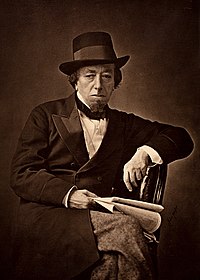
Back Portail:Conservatisme French Portal:Konservatisme NB Portal:Conservadorismo Portuguese Portal:Konservatism Swedish
| Main page | Showcase | Project |
Introduction
Conservatism is a cultural, social, and political philosophy and ideology, which seeks to promote and preserve traditional institutions, customs, and values. The central tenets of conservatism may vary in relation to the culture and civilization in which it appears. In Western culture, depending on the particular nation, conservatives seek to promote a range of institutions, such as the nuclear family, organized religion, the military, the nation-state, property rights, rule of law, aristocracy, and monarchy. Conservatives tend to favour institutions and practices that enhance social order and historical continuity.
Edmund Burke, an 18th-century Anglo-Irish statesman who opposed the French Revolution but supported the American Revolution, is credited as one of the forefathers of conservative thought in the 1790s along with Savoyard statesman Joseph de Maistre. The first established use of the term in a political context originated in 1818 with François-René de Chateaubriand during the period of Bourbon Restoration that sought to roll back the policies of the French Revolution and establish social order.
Conservatism has varied considerably as it has adapted itself to existing traditions and national cultures. Thus, conservatives from different parts of the world, each upholding their respective traditions, may disagree on a wide range of issues. Historically associated with right-wing politics, the term has been used to describe a wide range of views. Conservatism may be either libertarian or authoritarian, populist or elitist, progressive or reactionary, moderate or extreme. (Full article...)
Selected article
In his quarter-century on the Supreme Court, Scalia had staked out a conservative ideology in his opinions, advocating textualism in statutory interpretation and originalism in constitutional interpretation. He was a strong defender of the powers of the executive branch, believing presidential power should be paramount in many areas. He opposed affirmative action and other policies that treat minorities as groups. He filed separate opinions in large numbers of cases, and, in his minority opinions, often castigated the Court's majority in scathing language.
Selected quote
Now let us look at the ballot. We are told that this is an innovation, an unjust and an un-English measure. Much, I confess, is to be said on both sides, and I have not formed my opinion without deliberation, and I can see in the great constitution of my country a glorious and admirable structure, to which I would fain add two wings. Under the old system of representation I should not have thought ballot necessary, because that system was anomalous, and ballot could be of little use in a borough that had no electors. But if you will change, if you will give a constituency to every town returning members to Parliament, and if you will give to that constituency the legitimate right which the constitution contemplates, and which is a freeman's claim, you must add to the elective franchise vote by ballot. My gallant opponent, the breath of whose overpowering and convincing eloquence still hovers about the atmosphere of Wycombe, paused long before he indulged in the tirade which lately obtained so much notoriety through the medium of the 'Times' newspaper, I say to the son of the Prime Minister, that if the Whig ministry had not altered the representative system of the country, we should not have called for ballot ; but I now say, that in proportion as the electors increase in number, so does the necessity for the ballot. I am a Conservative to preserve all that is good in our constitution, a Radical to remove all that is bad. I seek to preserve property and to respect order, and I equally decry the appeal to the passions of the many or the prejudices of the few. I alike detest the despotism of an oligarchy and the pre-eminence of a mob. I shall ever seek to confer the greatest happiness upon the greatest numbers, and I conscientiously believe that in advocating triennial Parliaments and vote by ballot, I am labouring to promote this desirable end. As a statesman I should say that it is impossible to refuse popular demands well matured and energetically supported. If so, let the people be fitted to discharge the functions reposed in them ; and, as the means to this great end, I would unflinchingly advocate the repeal of the taxes on knowledge, because, though we admire and enjoy the liberty of the press, yet we feel its tyranny. Now, taxed as it is, it requires a large capital to carry on a newspaper, and its interests once established by a large circle of readers, and by an immense supply of advertisements, it bids defiance to the small capitalists who would embark in an untaxed competition, but are now overwhelmed by the oppressive impost laid on by Government.
— Benjamin Disraeli, speech at High Wycombe, England (27 November 1832)
Selected image
Benjamin Disraeli (1804 – 1881) was a British Prime Minister, parliamentarian, Conservative statesman and literary figure. Starting from comparatively humble origins, he served in government for three decades, twice as Prime Minister of the United Kingdom. Although his father had him baptised to Anglicanism at age 12, he was nonetheless Britain's first and thus far only Prime Minister who was born into a Jewish family—originally from Italy. He played an instrumental role in the creation of the modern Conservative Party after the Corn Laws schism of 1846.
Credit: Scewing
Did you know...
- ...that Ronald Reagan is the only president of the United States to have his diaries published into a best selling book?
- ... that author Jonathan Krohn gave a two-minute speech at the 2009 Conservative Political Action Conference at age thirteen?
- ... that Jens Wisløff, a Norway Conservative Party politician, was called "the grand old man of asphalt"?
Selected anniversaries in May
- 1979 – Margaret Thatcher becomes the first female Prime Minister of the United Kingdom.
- 1940 – the Norway Debate in the British House of Commons begins, and leads to the replacement of Prime Minister Neville Chamberlain with Winston Churchill three days later.
- 1988 – Section 28 is enacted in Great Britain with the effect of prohibiting the promotion of homosexuality by local authorities.
Topics
Associated Wikimedia
The following Wikimedia Foundation sister projects provide more on this subject:
-
Commons
Free media repository -
Wikibooks
Free textbooks and manuals -
Wikidata
Free knowledge base -
Wikinews
Free-content news -
Wikiquote
Collection of quotations -
Wikisource
Free-content library -
Wikiversity
Free learning tools -
Wiktionary
Dictionary and thesaurus
© MMXXIII Rich X Search. We shall prevail. All rights reserved. Rich X Search









